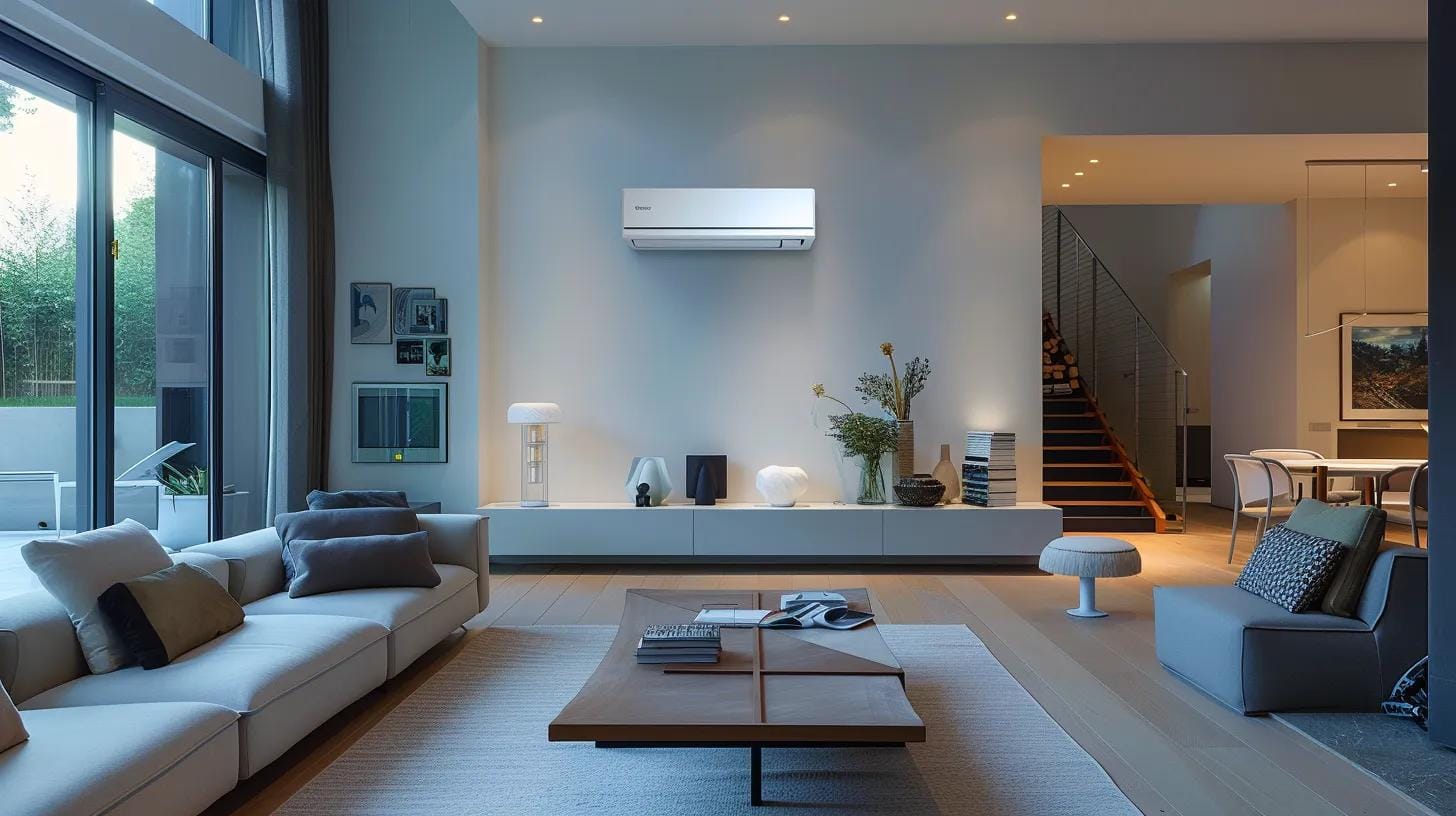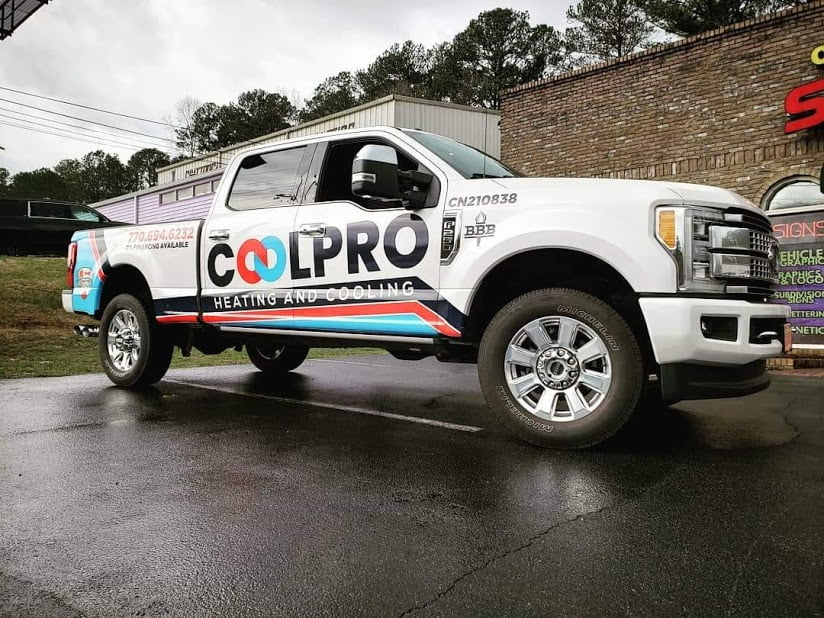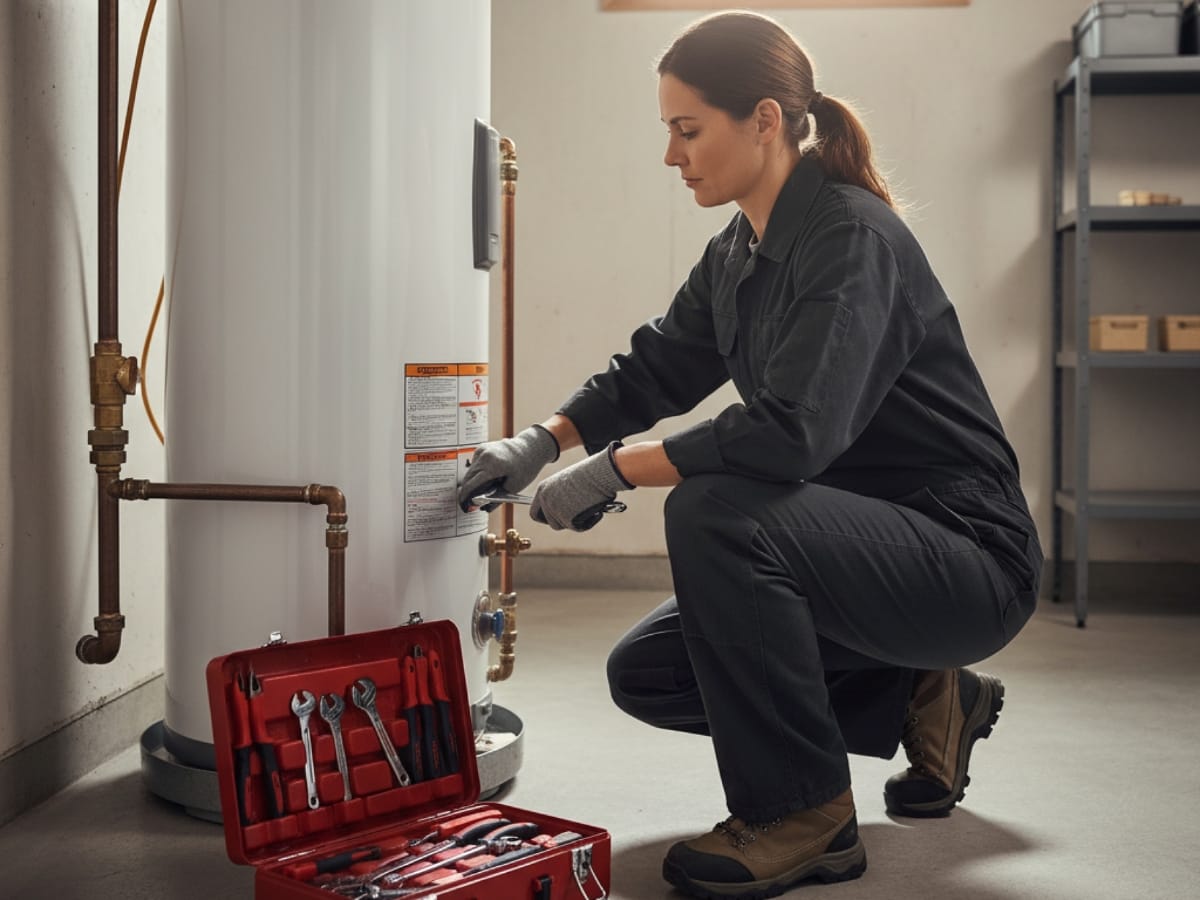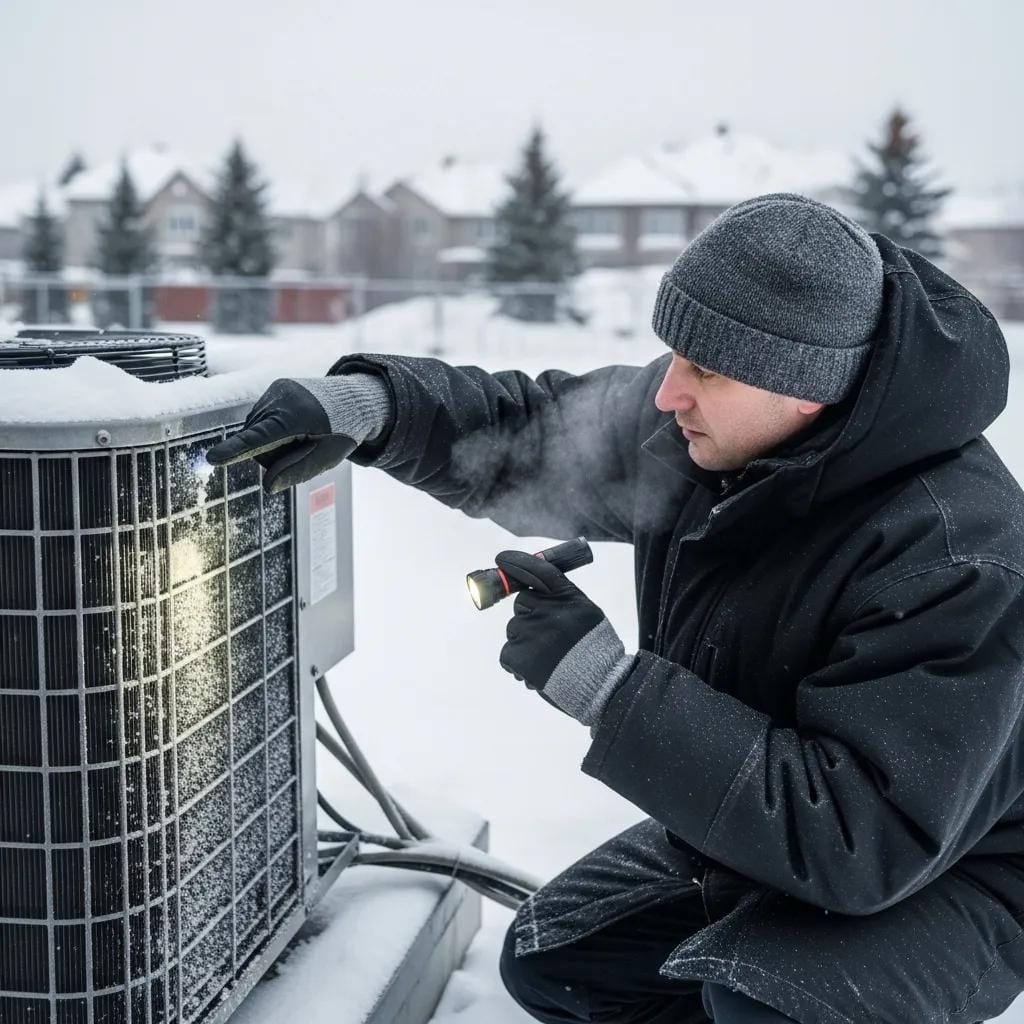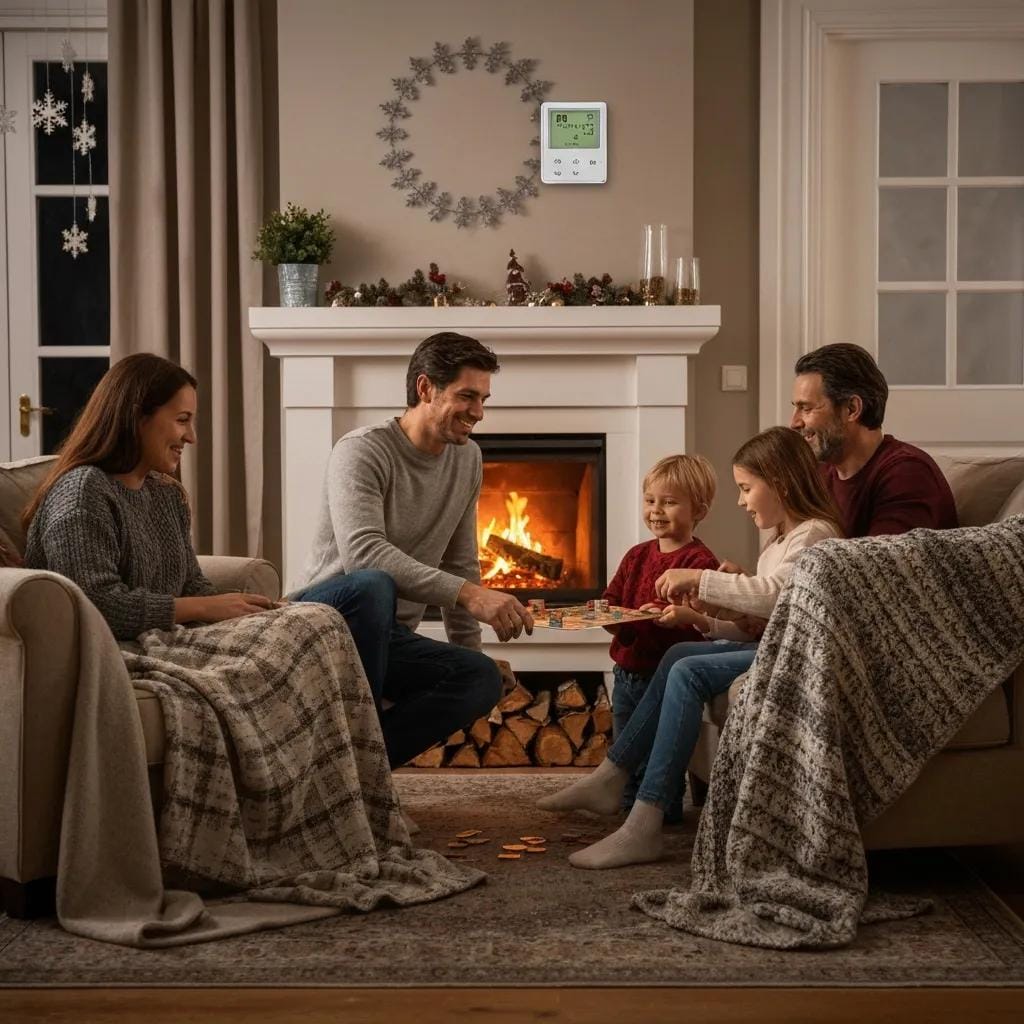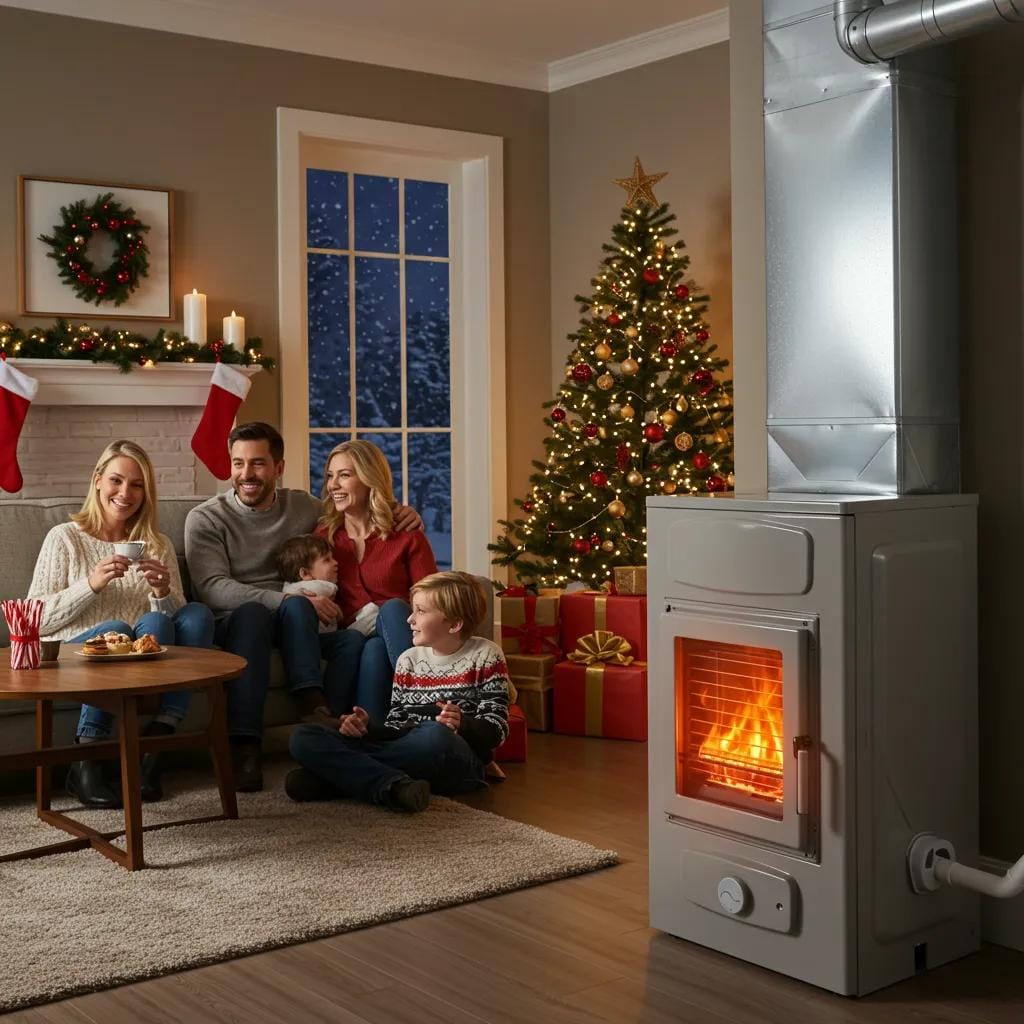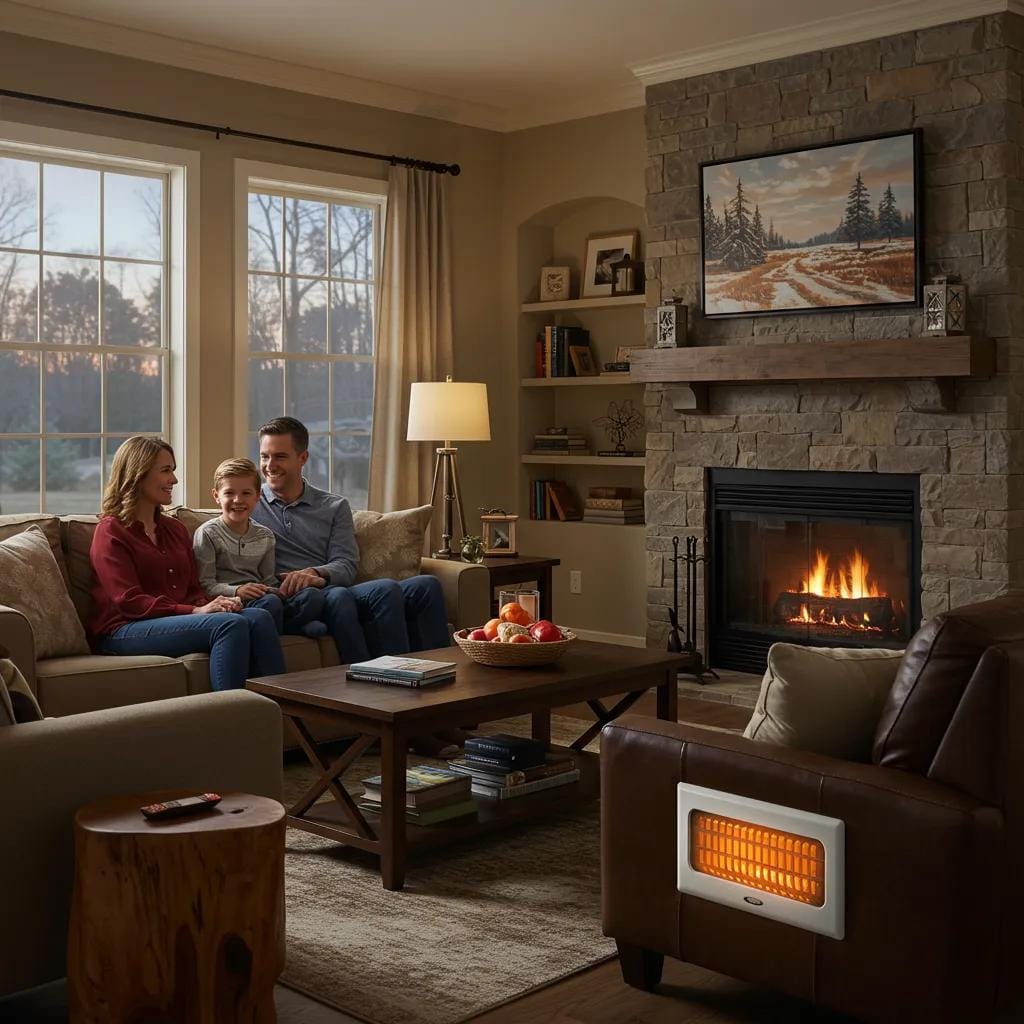Choosing the right air conditioner for your Roswell home can make all the difference when Georgia’s summer heat kicks in. With so many models and features available, it’s easy to feel overwhelmed. Whether you’re looking to upgrade an aging system, install AC in a new build, or simply improve energy efficiency, this quick guide will help you navigate your options. From central air systems to ductless mini-splits, we’ll break down what to consider and highlight the best air conditioners for comfort, performance, and value—so you can stay cool all season long.
Best Air Conditioners in Roswell: Stay Cool, Save Money
Understanding Roswell’s Climate and Your Cooling Needs
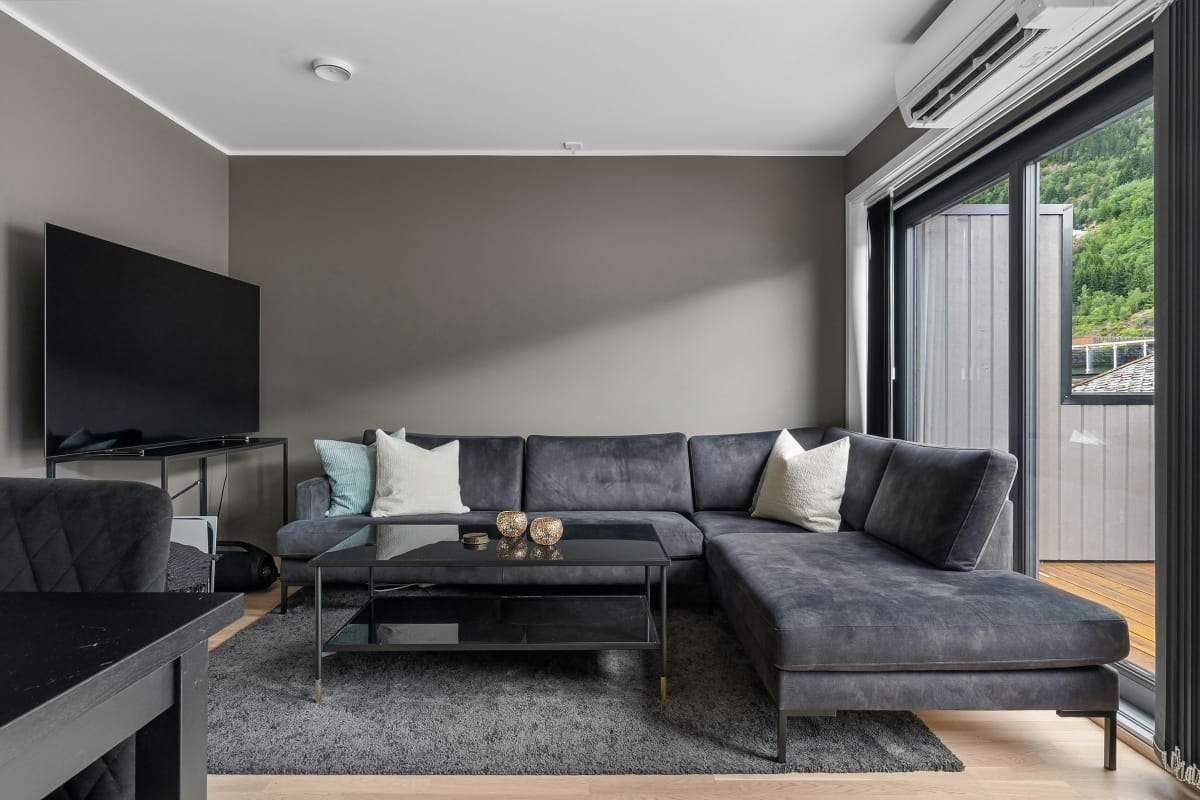
If you live in Roswell, Georgia, you know how hot and humid summers can get. While winters are fairly mild, the long stretch of warm weather puts a heavy demand on your air conditioning system. Choosing the right AC unit isn’t just about comfort—it’s about making sure your system is efficient, reliable, and built for local conditions. Understanding how Roswell’s climate affects your home is the first step toward making a smart cooling decision. From the size of your home to the direction it faces, several factors should influence what kind of system you install.
How Roswell’s Summers Impact Air Conditioner Choice
Roswell sees summer temperatures that regularly reach the 90s, and when combined with high humidity, indoor conditions can become uncomfortable fast. That’s why your air conditioner needs to do more than just blow cold air—it has to remove moisture from the air too. When looking at air conditioners, you’ll see a rating called BTU, or British thermal unit. This tells you how much heat the unit can remove from a space in one hour. In Roswell, you’ll typically need a higher BTU rating than you might in cooler parts of the country.
Efficiency also matters. The SEER2 rating (Seasonal Energy Efficiency Ratio) measures how much cooling the unit delivers per unit of energy consumed. A higher SEER2 rating means the system runs more efficiently, which translates to lower power bills over time. For Roswell’s climate, you’ll want to look for a system that performs well under high heat and humidity conditions.
Assessing Your Home’s Unique Cooling Requirements
Not all homes need the same type of cooling system. A one-size-fits-all approach won’t cut it in Roswell, especially when heat and sun exposure vary from house to house. Window units can be a good solution for small spaces or single rooms, but larger homes often benefit from central air or ductless mini-split systems. Mini-splits are popular in the area because they’re efficient and allow for zoned cooling—meaning you can cool certain parts of the house without running the system at full power all day.
Before buying, take into account square footage, ceiling height, number of windows, insulation, and even the direction your home faces. West-facing windows that get full afternoon sun will impact how hard your AC has to work to cool those areas.
The Importance of Proper Insulation for AC Effectiveness
A powerful AC unit won’t do much good if your home is poorly insulated. When cool air escapes through cracks, thin walls, or leaky windows, your system has to work harder to maintain your desired temperature. This leads to higher utility bills and more wear and tear on the equipment. In Roswell, where humidity is a factor, insulation also helps reduce the chance of moisture build-up inside walls or attics. Investing in better insulation—especially in older homes—can make a noticeable difference in how well your AC performs.
Check your attic and walls for proper insulation levels, and consider upgrading to energy-efficient windows if your home still has single-pane glass. Simple improvements like weather stripping and sealing around doors can also help.
Calculating Cooling Load for Roswell Properties
One of the most overlooked steps in choosing an air conditioner is getting a proper cooling load calculation. This process estimates how much cooling your home actually needs. It takes into account a wide range of variables, including insulation, window types, ceiling height, outdoor temperatures, and even how many people live in the home.
Cooling load calculations help avoid a common mistake: buying a unit that’s either too small or too large. A unit that’s too small won’t keep up during hot days, while one that’s too large will cycle on and off too frequently. This not only reduces efficiency but can also shorten the system’s lifespan and make it harder to control humidity levels. HVAC professionals use a combination of manual measurements and software to perform this calculation. The result is a recommendation tailored to your home’s specific conditions.
Identifying Top Performing Air Conditioners for Roswell Residences
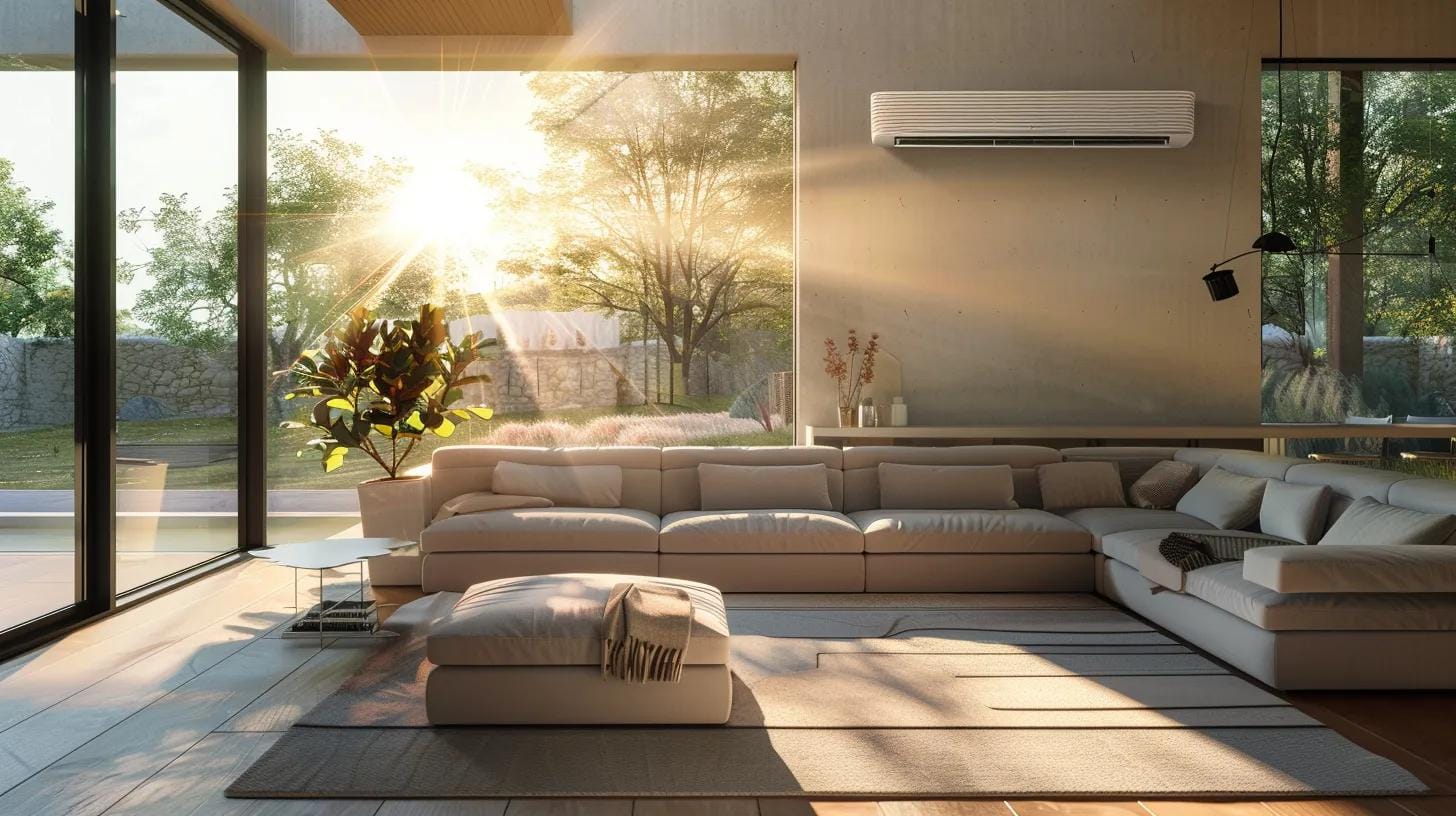
Choosing the right air conditioner for your home in Roswell is about more than just picking a well-known brand. The area’s long, humid summers and mild winters make it important to focus on energy efficiency, cooling performance, and long-term reliability. Whether you live in a condo, a single-family home, or a multi-level property, there’s no one-size-fits-all solution. The best system depends on the size and layout of your space, your comfort preferences, and how much you’re willing to invest upfront.
Understanding the strengths and limitations of different air conditioning systems can help you make a smart, cost-effective choice.
Comparing Different Types of Air Conditioning Systems
There are several main types of residential air conditioning systems, each with its pros and cons.
- Window Units: These are a popular option for small spaces or single rooms. They’re relatively inexpensive, easy to install, and don’t require any ductwork. However, they’re limited in how much space they can effectively cool and may be less efficient than other systems.
- Portable AC Units: These offer flexibility, especially for renters, but typically don’t perform as well as other options. They can be bulky and noisy, and many models require regular draining of condensation.
- Mini-Split Systems: Also known as ductless systems, these are great for homes that don’t already have ductwork. They allow for zoned cooling, meaning different rooms can be set to different temperatures. Mini-splits are known for their high efficiency and quiet operation, but the upfront cost can be higher than a window or portable unit.
- Central Air Conditioning: This is the most effective option for cooling an entire home evenly. Central AC systems are ideal for larger homes and offer consistent performance. They do require ductwork and professional installation, making them more of an investment, but they tend to increase a home’s resale value and are easier to manage with smart thermostats.
When comparing systems, also consider ongoing maintenance needs and how difficult it will be to install the unit in your existing space.
Features to Seek in the Best Air Conditioners for Roswell Homes
Roswell’s climate means you’ll want an AC system that can handle both heat and humidity. Key features to focus on include:
- Quiet Operation: Noise can be a concern, especially in smaller homes or open floor plans. Look for models that list decibel ratings in their specifications. Generally, anything below 60 decibels is considered relatively quiet.
- Energy Efficiency: Look for systems with a high SEER2 (Seasonal Energy Efficiency Ratio) rating. Higher SEER2 ratings usually mean lower energy bills over time. ENERGY STAR-certified units are also a good benchmark for efficiency.
- Dehumidification: High humidity can make a home feel warmer than it actually is. Some air conditioners have built-in humidity control, which helps improve comfort and reduces the risk of mold or moisture damage.
- Variable-Speed Compressors and Fans: These adjust cooling output based on indoor temperatures, which makes the system more efficient and helps maintain a steady temperature throughout the day.
- Smart Thermostat Compatibility: Being able to control your AC remotely or set detailed cooling schedules can help reduce energy waste. Many new models work with popular smart home systems.
Leading Air Conditioner Brands Available in Roswell
Several brands consistently receive good feedback from both homeowners and professionals in the Roswell area. Some of the most commonly installed and well-reviewed options include:
- Bryant: Known for reliability and efficient performance, Bryant offers a range of models for different home sizes and budgets.
- LG: Offers both window units and mini-split systems, many of which are designed with energy efficiency and quiet operation in mind.
- Frigidaire: A well-established brand with strong offerings in the window unit category, offering user-friendly features and solid cooling performance.
- Hisense: Often available at big-box stores, Hisense models tend to offer good value for the price and perform well in smaller to mid-sized rooms.
While brand matters, it’s equally important to choose a product that matches your space and cooling needs. A more affordable unit that’s the right size for your home can often outperform a high-end model that’s too powerful or too small.
Reading Reviews for Roswell Air Conditioner Performance
Reading customer reviews is a smart step in the decision-making process. Focus on feedback from Roswell or nearby areas whenever possible, since those reviews will reflect how the units perform under similar heat and humidity levels. Look for information on how well the unit maintains a consistent temperature, how loud it is during operation, and how often maintenance is needed. Reviews that mention BTU ratings and cooling capacity in real-world use can help you get a clearer picture than specs alone.
Key Factors for Selecting the Best Air Conditioner
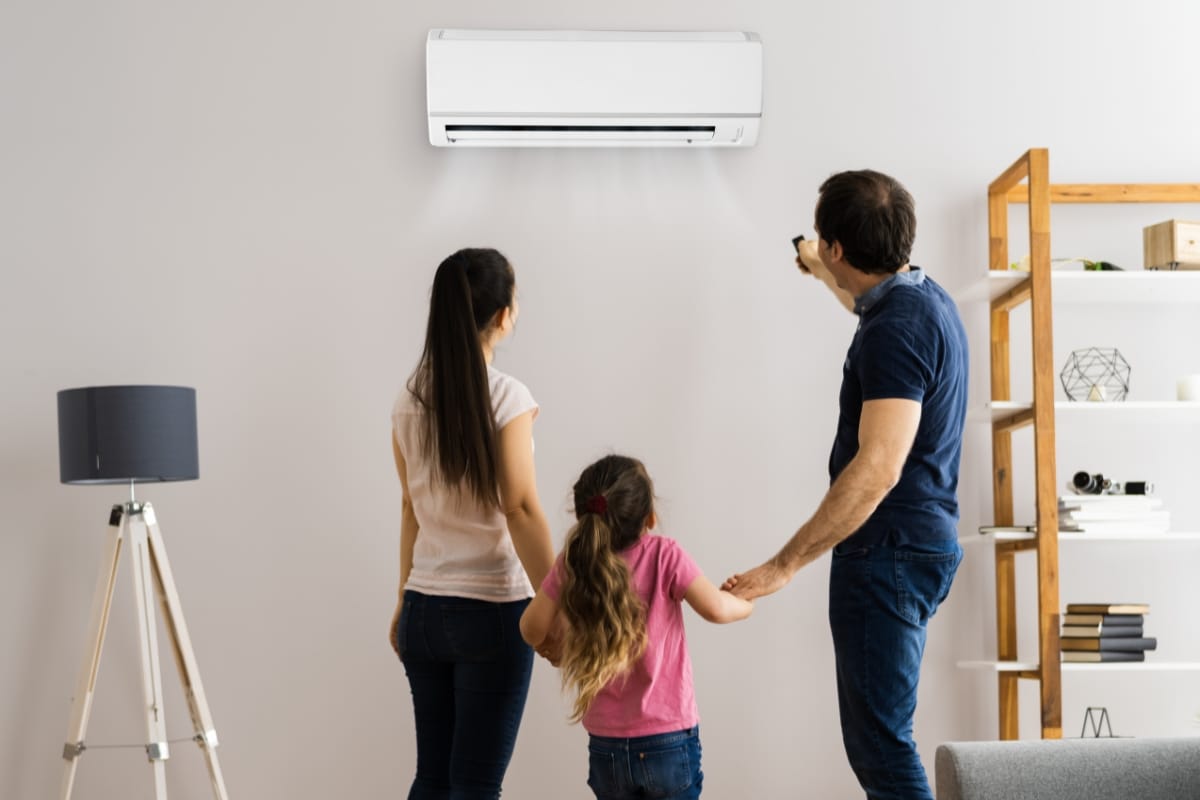
Choosing the right air conditioner is about more than just cooling power. In Roswell, where summers are long and humid, your AC unit plays a major role in maintaining comfort while also keeping energy bills under control. A unit that is too powerful, too small, or inefficient can lead to unnecessary costs, inconsistent temperatures, and frequent repairs.
Here are the key things to keep in mind when selecting a new AC unit for your home.
Prioritizing Energy Efficiency Ratings Like SEER2
If you’re replacing or upgrading your air conditioner, one of the first things to look at is its energy efficiency. In most product descriptions, this is listed as the SEER2 rating, which stands for Seasonal Energy Efficiency Ratio. The higher the SEER2, the more efficient the system.
For Roswell homeowners, where the AC runs heavily during the warmer months, a high-efficiency unit can make a noticeable difference in energy bills. Over time, a model with a SEER2 rating of 18 or higher may cost more upfront but save hundreds annually in electricity use compared to a basic model. Beyond SEER2, check for ENERGY STAR certification. These products meet government-backed standards for energy savings, which can be especially helpful when evaluating different brands and models.
Choosing the Correct AC Unit Size for Your Space
Bigger is not always better when it comes to air conditioners. An oversized unit will cool your home quickly but cycle on and off more often. This short-cycling increases wear and tear on the system and can make it harder to control indoor humidity. On the other hand, an undersized unit will struggle to maintain a comfortable temperature and may run constantly, using more energy and leading to higher utility bills.
Sizing is usually measured in BTUs (British thermal units), which reflect how much heat the system can remove from a space per hour. Determining the right size requires more than just square footage. You also need to factor in ceiling height, insulation, window exposure, and even how many people live in the house. To get this right, it’s best to rely on a load calculation done by an HVAC professional. They’ll use specific measurements and climate data to recommend a unit that’s just the right size for your home—not too large and not too small.
Evaluating Noise Levels of Various AC Models
Noise might not seem like a big concern at first, but once the AC is running nonstop during summer, it can become a problem—especially in quiet areas like bedrooms or home offices. Modern AC units are designed to run more quietly than older models, but there’s still a wide range of sound levels. These are usually listed in decibels (dB) in the product specifications. For reference, a quiet conversation is about 50 dB. Some of the quieter central air systems and mini-splits operate around 40 to 50 dB, which is relatively unobtrusive.
If low noise is a priority, look for models with features like insulated compressor compartments and variable-speed fans. These technologies reduce vibration and avoid the loud, abrupt starts and stops that older systems often produce.
Considering Smart Thermostat Compatibility for Modern ACs
More homeowners are turning to smart thermostats to help manage energy use and improve comfort. When paired with a compatible air conditioner, these thermostats allow for remote control, scheduling, and even automatic adjustments based on weather or occupancy.
Many modern AC units now integrate with smart home platforms like Amazon Alexa, Google Home, and Apple HomeKit. This lets you change the temperature with a voice command or smartphone app, even when you’re not at home. Smart thermostats also provide data on your energy usage, which can be helpful if you’re trying to identify patterns or reduce costs. Some models even use geofencing to adjust settings automatically when you leave or return home.
Achieving Efficient Comfort With Your Roswell Air Conditioner
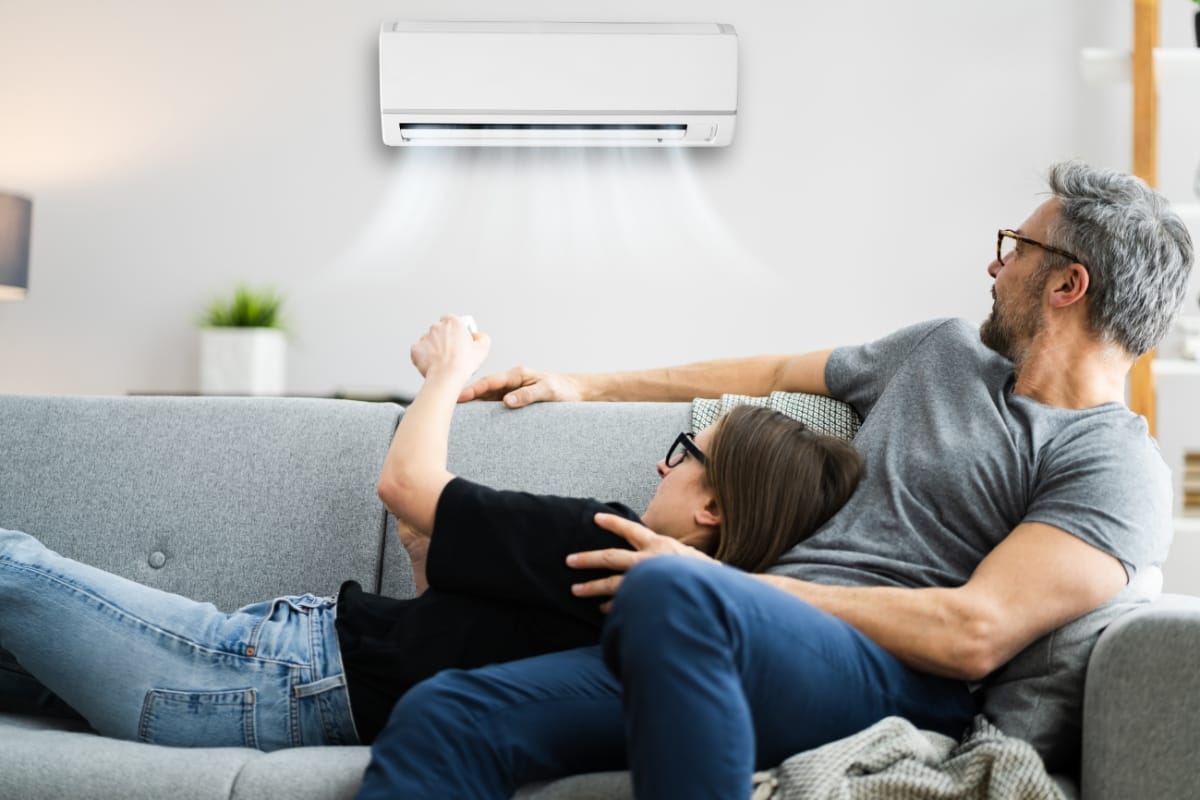
Buying the right air conditioner is just the first step. To get the best performance out of your system—especially during Roswell’s hot, humid summers—you also need to manage how the system is used day-to-day. A well-maintained AC paired with smart usage habits can lead to lower energy bills, fewer repairs, and a more comfortable home.
Here are several practical ways to make sure your AC runs efficiently long after installation.
Optimizing Thermostat Settings for Energy Savings
Your thermostat controls when and how often your air conditioner runs, so using it wisely can make a big difference in your energy usage. A good rule of thumb is to set the thermostat a few degrees higher when you’re not home or while sleeping. Even a 1- or 2-degree adjustment can reduce energy use by around 3 percent per degree.
For example, setting your thermostat to 78°F while you’re home and 82°F while you’re away can help balance comfort and savings. Avoid turning the temperature way down to “cool the house faster”—it doesn’t work and can overburden the system.
A programmable thermostat can automate these adjustments for you. Smart thermostats go a step further by learning your habits and adjusting settings based on your daily routine, outdoor weather, and whether anyone is home. Over time, these small changes add up to noticeable savings.
The Role of Regular Maintenance in AC Efficiency
Regular upkeep plays a major role in how well your AC performs. Ignoring basic maintenance not only lowers efficiency but can also shorten the life of the system. The most important task is checking and changing the air filter. A dirty filter restricts airflow, making your system work harder than it should. In most homes, filters should be replaced every one to three months depending on usage, household size, and whether pets are present.
It’s also important to inspect and clean the air ducts, especially in older homes where dust and debris can build up over time. Blocked or leaking ducts can cause cooled air to escape before it ever reaches the rooms you’re trying to cool. Professional maintenance is recommended at least once a year. During a tune-up, a technician will check refrigerant levels, inspect electrical components, test system controls, and make sure the unit is running at peak performance. Catching small problems early can prevent costly repairs down the road.
Utilizing Fans to Supplement Your Air Conditioner
Fans don’t cool the air themselves, but they do help distribute cooled air more evenly. When used along with your air conditioner, ceiling fans or portable fans can make a room feel cooler, allowing you to raise the thermostat a few degrees without sacrificing comfort.
Ceiling fans should spin counterclockwise in the summer to push cool air downward. This simple change improves air circulation and helps maintain consistent temperatures throughout the room. Using fans in rooms that tend to get warmer—like those with lots of windows or limited airflow—can reduce hot spots and help your AC work more efficiently overall.
Improving Airflow Throughout Your Roswell Home
Airflow is critical to how well your AC works. Blocked or restricted airflow can cause uneven temperatures and put unnecessary strain on the system. There are a few common issues that can reduce airflow and how to fix them:
- Blocked vents: Check that supply and return vents aren’t covered by rugs, furniture, or curtains. Even partially blocked vents can impact how well your system cools the space.
- Dirty ductwork: Dust, pet hair, and debris can build up inside ducts over time. Having ducts professionally cleaned every few years can improve airflow and indoor air quality.
- Poor return air circulation: In some homes, air returns are limited to one or two locations. Adding return pathways (such as transfer grilles or jumper ducts) can help air move more freely between rooms and reduce pressure imbalances.
- Use of vent deflectors: In areas where airflow is blocked by furniture or wall layout, vent deflectors can redirect cool air where it’s needed.
If you still have areas that feel warmer or less comfortable, using portable fans or opening interior doors can help improve circulation throughout the home.
Installation Practices for Your New Air Conditioner in Roswell
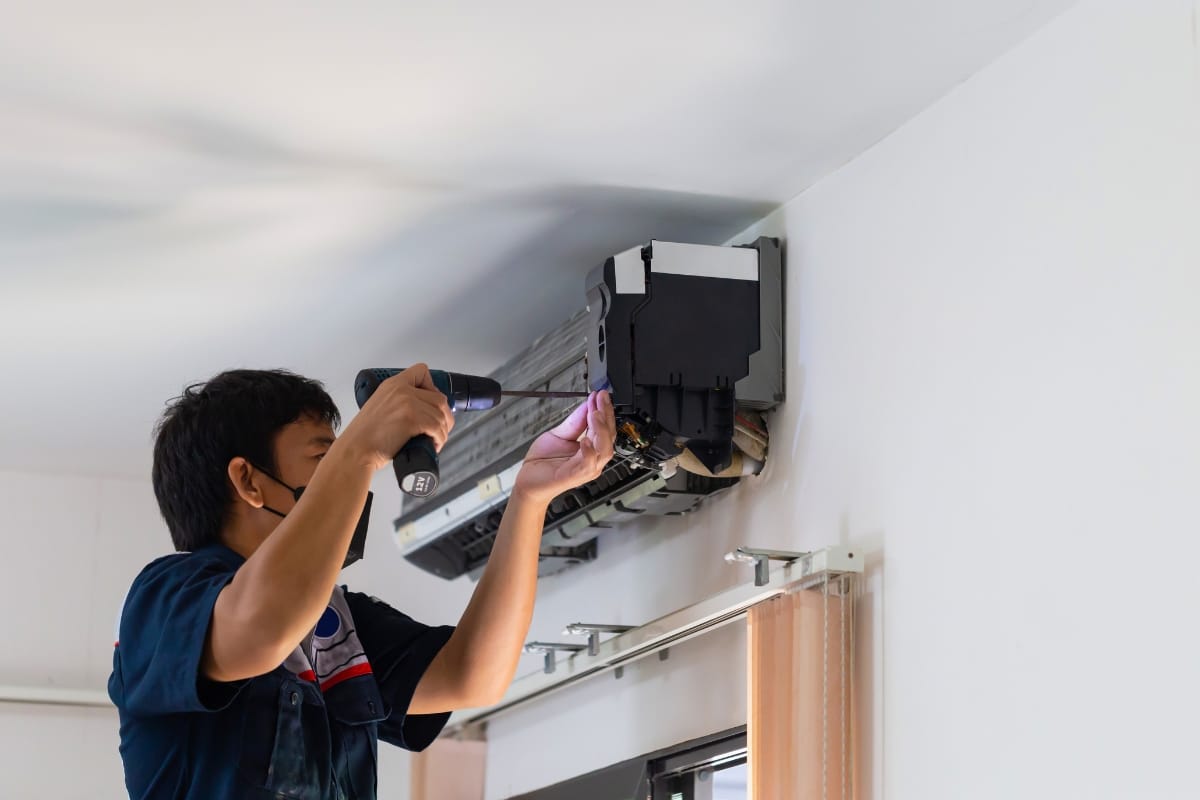
Getting a new air conditioner installed is a big investment, and how it’s installed matters just as much as the unit you choose. A professional installation ensures your system runs efficiently, lasts longer, and delivers consistent comfort throughout your home—especially in a climate like Roswell’s, where high heat and humidity are the norm in summer.
Experienced HVAC technicians know how to install systems properly, following local codes and manufacturer specifications. From the placement of the units to final safety checks, every step plays a role in how well your air conditioner will perform.
Selecting Qualified HVAC Technicians in Roswell
Not all HVAC installers are the same. Before hiring a technician, check that they are licensed to work in Georgia and carry proper insurance. Look for certifications from reputable industry organizations like NATE (North American Technician Excellence), which indicate training and up-to-date knowledge.
Read online reviews and ask neighbors or local community groups for referrals. A good technician should be able to explain their process, offer a detailed written estimate, and answer any questions about your home’s specific cooling needs. Make sure they’re familiar with Roswell’s local climate and housing styles, as this can impact how the system is designed and installed.
What to Expect During the AC Installation Process
The installation process begins with a home assessment. The technician will measure the square footage, inspect your current ductwork (if applicable), and determine the right size unit based on a cooling load calculation. This step is crucial. Installing a system that’s too large or too small can cause efficiency problems, higher energy bills, and uneven cooling.
Once the right size and type of unit are selected, installation typically follows these steps:
- Removal of the old unit: If you’re replacing an existing system, the team will safely disconnect and remove it.
- Setting up the new equipment: The new indoor and outdoor units are installed, along with necessary lines for refrigerant, power, and drainage.
- Connecting and securing: Electrical wiring, thermostat, and ductwork are connected or adjusted to match the new system.
- System testing: After installation, the technician tests every component to make sure the unit cools properly and operates safely.
The process may take anywhere from one to two days depending on the size of your home and whether new ductwork or electrical upgrades are needed.
Proper Placement of Indoor and Outdoor AC Units
Placement of your AC units—both indoor and outdoor—affects how efficiently your system operates.
- Indoor unit considerations: The air handler or indoor portion of your unit should be installed in a location that allows for good airflow and easy access for future maintenance. It should not be blocked by furniture or located in areas prone to moisture buildup.
- Outdoor unit considerations: The condenser (the outdoor unit) should be placed on a level, stable surface like a concrete or composite pad. It needs at least two to three feet of clearance on all sides and should be away from walls, fences, or landscaping that could obstruct airflow. Avoid placing it in direct sunlight if possible, as excess heat can reduce efficiency.
Proper placement helps the system run more smoothly and can reduce wear on the components over time.o days depending on the size of your home and whether new ductwork or electrical upgrades are needed.
Post-Installation Checks for Optimal AC Function
Once the unit is up and running, your HVAC technician should perform a series of checks to confirm that the installation was successful:
- Airflow verification: They will test vents and ducts to ensure cool air is being distributed evenly throughout your home.
- Refrigerant pressure checks: Correct refrigerant levels are essential for efficient operation. Too much or too little can damage the compressor.
- Thermostat calibration: The thermostat will be programmed and tested to make sure it accurately controls the system.
- Electrical safety: All wiring and connections are checked to avoid any safety hazards or interruptions in service.
- Drainage system check: The condensate drain line should be inspected to confirm it is flowing freely and not at risk of clogging.
Before leaving, the technician should also walk you through basic maintenance tasks like filter changes and explain how often you should schedule inspections or tune-ups.
Maintaining Your Roswell AC for Peak Performance and Longevity
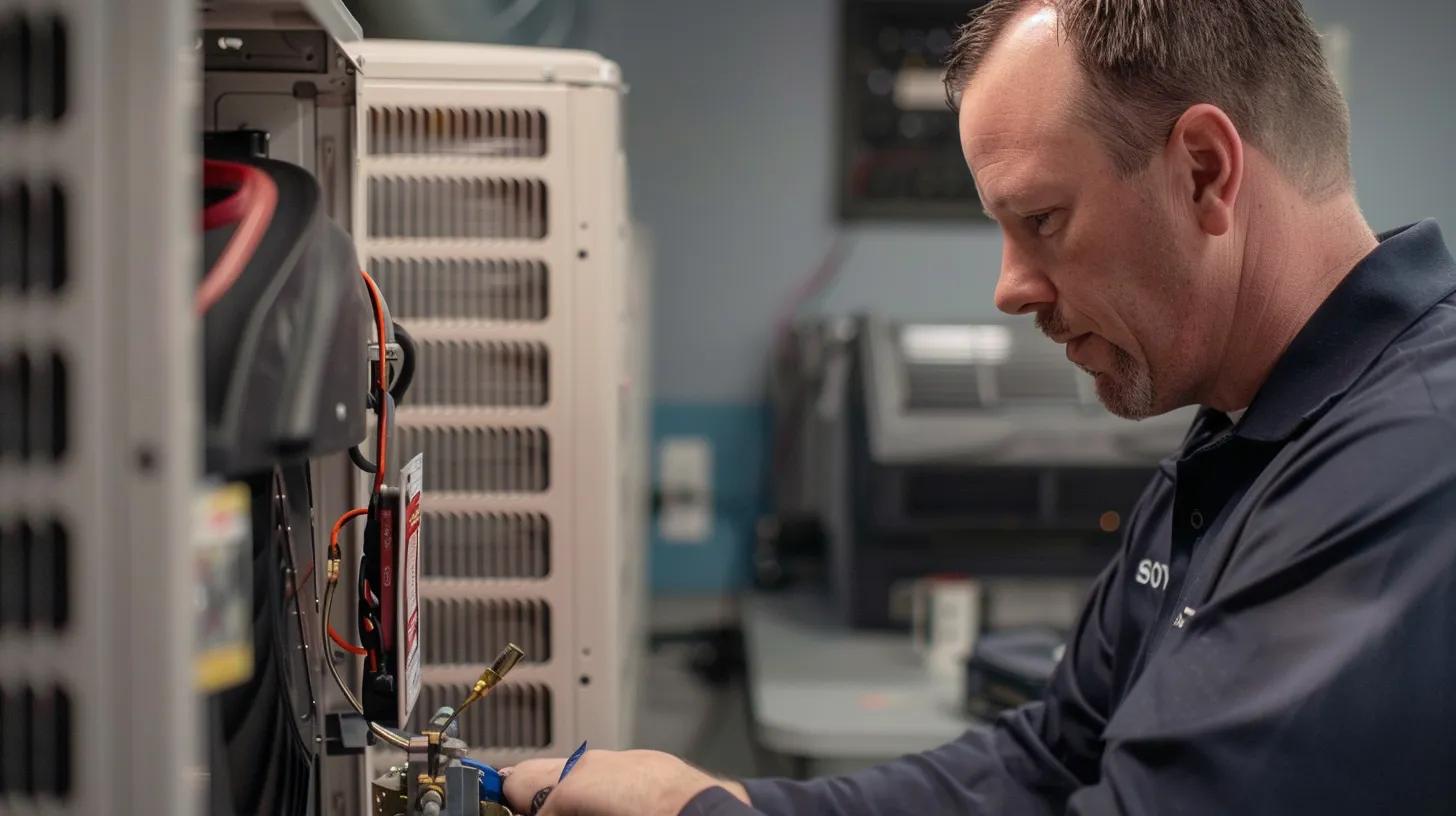
Air conditioning is essential in Roswell, especially during the long, humid summers. But even the most efficient unit won’t perform well without regular upkeep. Routine maintenance not only helps your system run better, but also keeps your energy bills in check and extends the lifespan of your equipment. Whether you handle basic tasks yourself or bring in a technician for more complex work, taking care of your AC system is a smart way to protect your investment.
Simple DIY Air Conditioner Maintenance Tasks
There are a few simple maintenance steps that most homeowners can do regularly. These small efforts can have a big impact on system performance and help avoid unnecessary strain. Start with the air filter. Replacing or cleaning your air filter every one to two months keeps air flowing properly and reduces the amount of dust and debris inside your system. Dirty filters make your unit work harder than necessary, which increases energy use and can lead to breakdowns.
You should also make a habit of checking the outdoor condenser unit. Remove leaves, grass, and other debris from around the unit to keep airflow unrestricted. Use a garden hose to gently rinse the fins—just be careful not to bend them. Inside your home, make sure supply and return vents are not blocked by furniture or curtains. Clean them occasionally to prevent dust buildup. This allows air to circulate freely and helps your system cool your home more evenly.
Scheduling Professional AC Tune-Ups in Roswell
While regular DIY maintenance is helpful, it can’t replace the value of a professional tune-up. An experienced HVAC technician can inspect and test parts of the system that most homeowners cannot access. Ideally, you should schedule a tune-up twice a year—once in the spring before the summer heat arrives, and again in the fall after peak usage.
During a tune-up, the technician will check refrigerant levels, test the thermostat, inspect electrical connections, clean the evaporator and condenser coils, and make sure the blower components are functioning properly. These inspections help catch issues early, before they turn into costly repairs or system failures during a heatwave. Professional service also helps your AC run more efficiently. A well-maintained system can use less energy to produce the same level of cooling, saving money on monthly utility bills.
Recognizing Early Signs of AC System Issues
Your AC system will often give you signs when something is off. Paying attention to these early indicators can help you avoid more serious problems down the line. For example, if your unit is making strange noises—such as rattling, buzzing, or hissing—it could mean loose parts, airflow problems, or refrigerant leaks. If the system is cycling on and off too often, it may be a sign that it’s not sized properly or that there’s an electrical issue.
Other red flags include uneven cooling between rooms, water pooling around the unit, or a sudden spike in your energy bill. If you notice any of these problems, it’s best to schedule a diagnostic check before the issue gets worse.
Extending the Lifespan of Your Air Conditioning Unit
Most central air conditioning systems last between 12 to 17 years, but how you use and maintain your unit plays a big role in how long it will actually serve your home. Taking a few extra steps can make a difference in both performance and longevity. Avoid setting the thermostat too low during peak heat. Instead, aim for a consistent temperature around 74 to 78 degrees when you’re home, and a few degrees higher when you’re away. Constantly adjusting the thermostat or cranking it down too far can cause extra wear and tear.
Make sure your home is properly insulated and sealed. If cool air is escaping through gaps around doors, windows, or attic spaces, your AC will have to work harder. Adding insulation or sealing leaks can reduce that strain and keep temperatures more stable.
If you plan to upgrade or replace parts of your system, such as the thermostat or ductwork, choose components that are compatible with your unit and designed to enhance energy efficiency. Programmable or smart thermostats, for instance, can help manage indoor temperatures more effectively and take some of the load off your AC. Finally, don’t ignore routine inspections. Even if your system seems to be working fine, a yearly checkup is still worth the time and cost. A well-maintained system not only lasts longer but delivers better comfort and air quality for your home.
Smart Thermostats and Controls for Enhanced AC Management
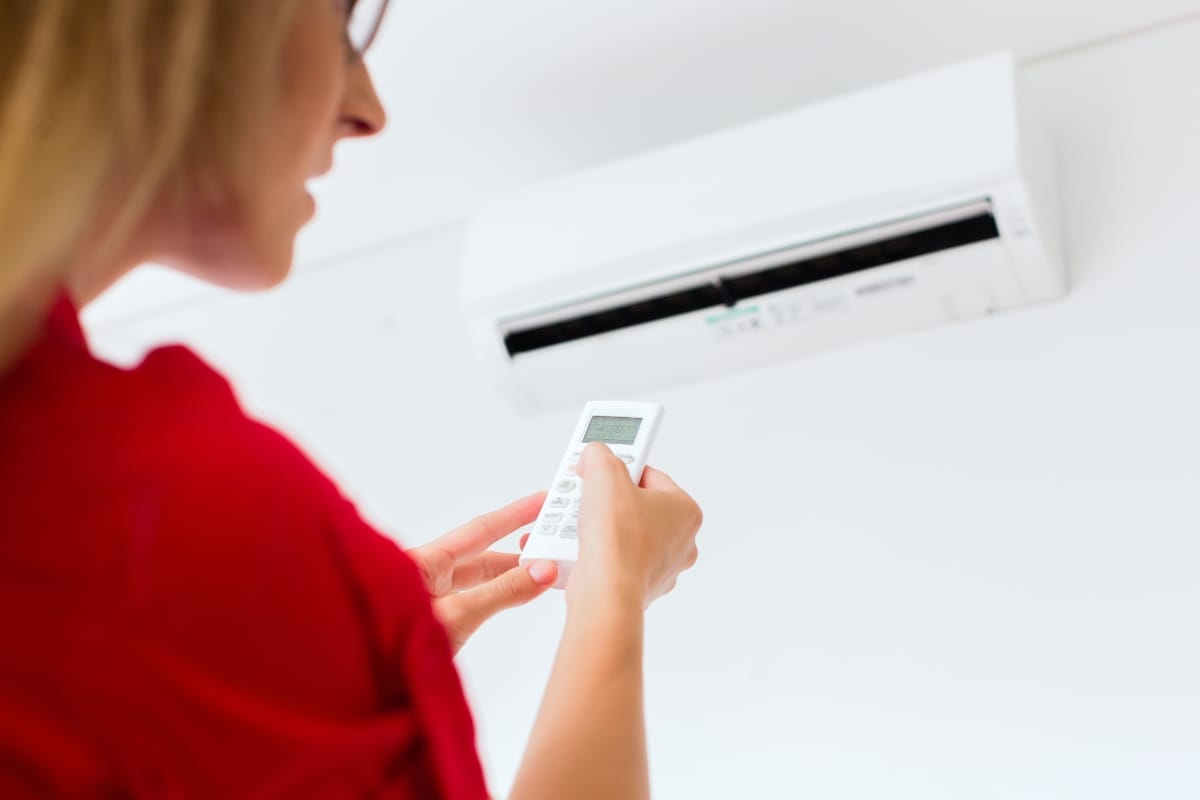
Managing your air conditioning system efficiently goes beyond just having the right equipment. With Roswell’s long, hot summers, optimizing your cooling system is essential not only for comfort but also for managing energy use. Smart thermostats and advanced controls can help homeowners strike that balance. These modern tools make it easier to monitor usage, reduce waste, and keep indoor temperatures comfortable without constant manual adjustments.
Benefits of Upgrading to a Smart Thermostat in Roswell
Smart thermostats are designed to do more than just control temperature. They learn your habits over time and make automatic adjustments to maximize comfort while reducing energy consumption. Whether you are heading out for work or coming home early, these systems respond to your schedule and help maintain a consistent indoor climate.
One of the biggest benefits is energy savings. By using a thermostat that adapts to your daily routine, your air conditioning unit only runs when necessary. That alone can lead to noticeable reductions in your utility bills over the course of the year. Many smart thermostats also provide detailed energy reports, showing where you might be able to improve efficiency even further.
These systems are also ideal for Roswell’s unpredictable weather swings. A smart thermostat can adjust in real-time based on sudden changes in outdoor temperature or humidity. Some models even use your phone’s location to determine when you’re close to home and prep your space accordingly.
Programming Your Thermostat for Maximum Efficiency
One of the simplest ways to improve AC efficiency is by programming your thermostat correctly. Most smart models offer user-friendly interfaces that let you create a temperature schedule based on your daily routine.
For example, if your home is empty during the workday, you can schedule the system to raise the indoor temperature a few degrees during those hours. It can then cool things back down before you return. The same logic can be applied to weekends or nights—adjusting the temperature for sleeping hours and reducing strain on your system when fewer rooms are in use.
Some smart thermostats take it a step further by learning these patterns automatically. They monitor how often you make changes to the temperature and begin to adjust the schedule accordingly. Over time, the system essentially programs itself to match your preferences without you having to lift a finger.
Remote AC Control for Convenience and Savings
One of the most convenient features of smart thermostats is the ability to control them remotely. With a smartphone app, you can adjust your home’s temperature from anywhere. Whether you’re at work, on vacation, or simply out running errands, you have full control over your system.
This is especially helpful if your schedule changes suddenly. For instance, if you were planning to be away for the weekend but return early, you can activate your cooling system while on the drive back so the house is comfortable when you arrive. Similarly, if you forgot to raise the temperature before leaving, a quick adjustment from your phone prevents unnecessary energy use while the home is empty.
Remote control is also great for households with irregular schedules. If different family members come and go at different times, the system can still keep up with varying cooling needs without wasting energy.
Integrating Your AC With Home Automation Systems
Another step toward efficient air conditioning is integrating it with a full home automation system. Many smart thermostats are compatible with platforms like Google Home, Amazon Alexa, and Apple HomeKit. When connected, your air conditioning can work in tandem with other devices like smart lighting, blinds, or fans.
This integration allows for smarter energy management. For example, during the hottest part of the day, the system might automatically close motorized shades and lower the temperature slightly to maintain comfort while minimizing sun-related heat gain. In the evening, lights and AC settings can shift together as the home transitions to nighttime use.
You can also set up voice controls, automations based on occupancy, or routines that shift settings based on weather forecasts. The result is a system that works together rather than each appliance operating independently, helping to lower energy consumption without sacrificing convenience.
Comparing Costs and Securing Value in Roswell AC Units
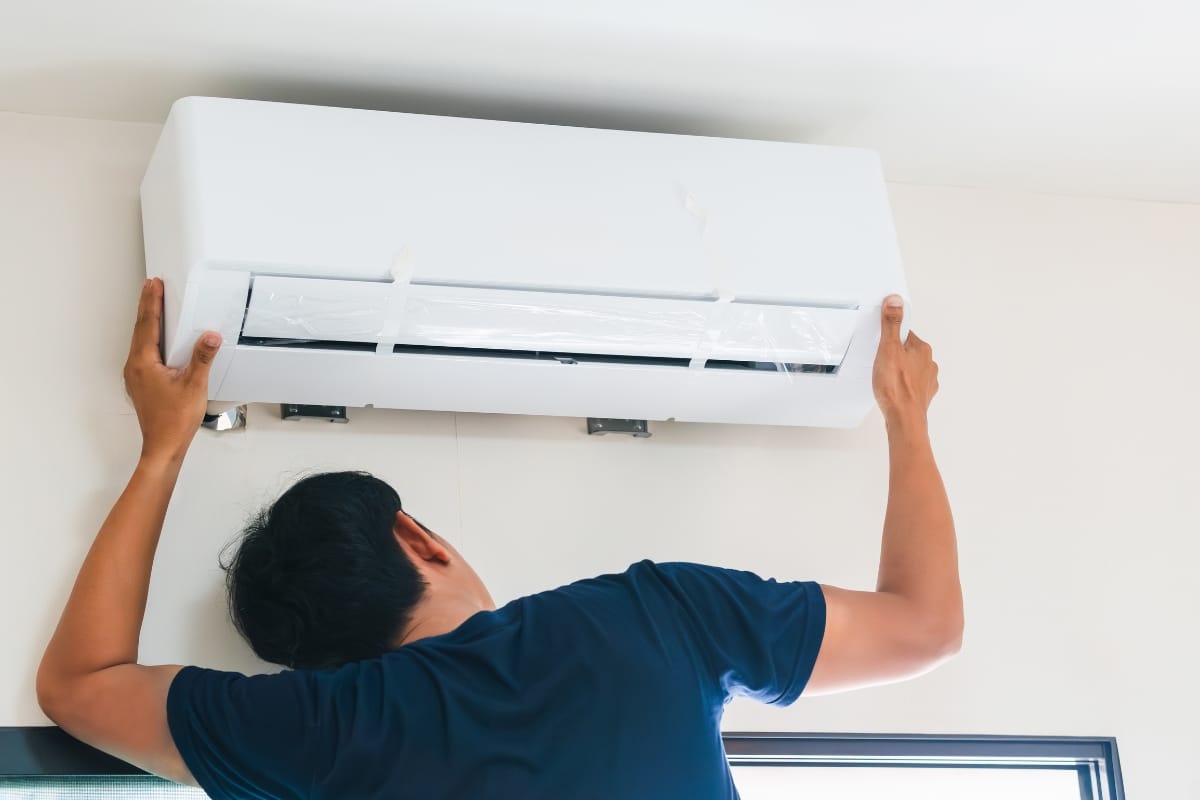
If you’re in the market for a new air conditioning system in Roswell, you know it’s not just about finding the lowest price. Choosing the right AC unit involves weighing the upfront cost against long-term performance, energy use, and maintenance. With Roswell’s hot summers and muggy afternoons, investing in the right system can have a big impact on both your comfort and your utility bills.
Understanding Initial Purchase Price Versus Long-Term Operating Costs
The price tag on a new AC unit might catch your attention, but that number doesn’t tell the whole story. A cheaper system might save money today, but it could cost you more down the road in higher energy bills, more frequent repairs, or a shorter lifespan.
High-efficiency systems, especially those with strong SEER2 ratings, usually cost more up front but use less energy to cool your home. That means lower utility bills month after month, and that savings adds up over the years. When you look at the total cost of ownership, energy-efficient models often come out ahead—even when installation is factored in. Don’t forget to consider ongoing costs like filter replacements, tune-ups, and any service visits. Systems that are easier to maintain or come with longer warranties can help you avoid surprises later.
Exploring Rebates and Incentives for Efficient ACs in Roswell
Before you make a final decision, take time to look into available rebates and energy efficiency incentives. These programs are often offered by local utility companies or state agencies and are designed to make energy-efficient systems more affordable for homeowners.
In some cases, you could qualify for a rebate simply by choosing a system that meets specific efficiency criteria. Other programs may offer cash back for upgrading from an older, less efficient model. These savings won’t necessarily show up in the sticker price, but they can have a real effect on your bottom line. Be sure to check eligibility and application deadlines before making a purchase.
Obtaining Multiple Quotes From Roswell AC Installers
When you’re ready to install a new AC, don’t settle for the first estimate you receive. Reach out to several licensed HVAC companies in Roswell and ask for written quotes. Make sure each quote outlines the full scope of work, including the cost of the unit, labor, materials, permits, and any additional fees that might apply.
Getting multiple estimates helps you understand what’s typical for your area and protects you from being overcharged. It also gives you a chance to compare the services being offered. Some companies may include post-installation maintenance or longer warranties in their pricing. Others may use different brands or offer various installation approaches. This gives you leverage to ask questions and choose the best option for your needs.
When comparing contractors, don’t base your decision on price alone. Take time to check licenses, read reviews, and verify insurance. A well-reviewed company with a proven track record can save you money and headaches in the long run.
Financing Options for Your New Air Conditioner
Even if the long-term savings are clear, a new AC system is still a big investment. If paying upfront isn’t feasible, many HVAC companies offer financing plans that spread the cost out over time. These can include fixed monthly payments, low-interest or no-interest promotions, and even deferred payment options.
Financing can be especially helpful if your AC breaks down unexpectedly and you need a replacement quickly. Rather than settling for a lower-quality model due to budget constraints, financing gives you the option to choose the right unit for your home while paying in installments.
It’s a good idea to explore multiple financing offers. Some may be through the HVAC company itself, while others might be available through third-party lenders or utility programs. Pay close attention to interest rates, repayment terms, and any associated fees.
Troubleshooting Common Air Conditioner Problems in Roswell Homes
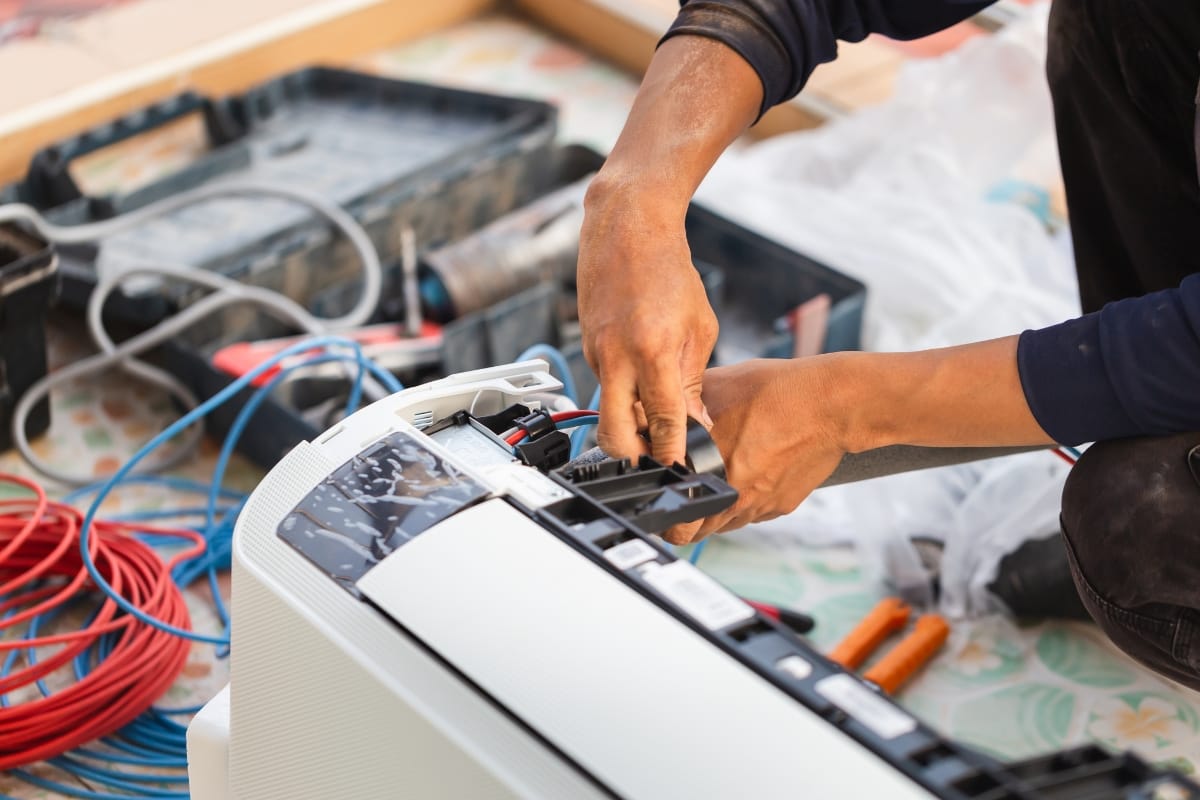
Even a well-maintained air conditioner can run into problems, especially during Roswell’s long, hot summers. While some issues are minor and can be handled at home, others may need the attention of a trained technician. Knowing what to look for can help you fix small problems before they turn into bigger, more expensive ones. Here’s a closer look at some of the most common AC problems homeowners face—and how to handle them.
Addressing an AC Unit That Blows Warm Air
If your air conditioner is running but pushing out warm or room-temperature air, it could be due to several causes. The most common reasons include low refrigerant levels, dirty air filters, blocked airflow, or a malfunctioning compressor.
Start with the simplest fix: check your air filter. If it’s dirty, swap it out with a clean one. A clogged filter can restrict airflow and prevent the system from cooling properly. Next, make sure your vents are open and not blocked by furniture or curtains. If the issue continues after those checks, the problem may be more serious. Low refrigerant or compressor trouble often requires a technician to diagnose and fix. Leaks in the refrigerant lines can reduce cooling efficiency and lead to system damage if ignored for too long.
What to Do When Your Air Conditioner Won’t Turn On
An AC that won’t turn on at all can be frustrating, especially on a hot day. Before you assume the worst, take a few minutes to go through some basic steps. Start by checking the thermostat. Is it set to “cool”? Is the temperature set lower than the current room temperature? If everything looks right there, check your breaker panel. A tripped breaker or blown fuse could be the reason the system isn’t getting power.
If the unit still doesn’t respond, it might be an issue with the thermostat wiring, a failed capacitor, or a blown motor. These are jobs for an HVAC professional who can test each part safely and accurately.
Dealing With Unusual Noises From Your AC System
All air conditioners make some noise, but if you notice new or strange sounds, they shouldn’t be ignored. Rattling could mean a loose panel or part. Grinding might point to motor bearing problems. A high-pitched whine or buzzing could signal electrical issues.
Turn off the system and try to locate where the noise is coming from. Sometimes, tightening a few screws or replacing a worn fan belt can take care of the problem. But ongoing or worsening noises usually suggest internal wear that needs a technician’s attention. Ignoring them can lead to breakdowns or further damage.
Managing Water Leaks From Your Air Conditioner
AC units remove moisture from the air as part of the cooling process. That water is supposed to drain away through a condensation line, but clogs or pump failures can cause leaks inside or around your system.
If you notice pooling water or signs of moisture near the indoor unit, check the drain line first. Clear any debris or algae buildup using a wet-dry vacuum or cleaning solution made for HVAC systems. Also, make sure the unit is level; an uneven surface can prevent proper drainage. If leaks continue or you see signs of water damage, mold, or rust around the unit, it’s time for a service call. Persistent leaks can damage walls, ceilings, and even the AC unit itself.
Other Signs Your AC Needs Attention
Not all problems are obvious. Some signs that your air conditioner might be struggling include short cycling (turning on and off too often), higher-than-usual energy bills, uneven temperatures between rooms, or poor airflow from vents. These issues can stem from things like dirty coils, leaky ducts, or failing components.
Even if your system seems to be running, these early symptoms can signal inefficiency or stress that will worsen if ignored. It’s always best to schedule a tune-up or inspection when you notice your system isn’t working as well as it used to.
When to Repair or Replace Your Roswell Air Conditioner
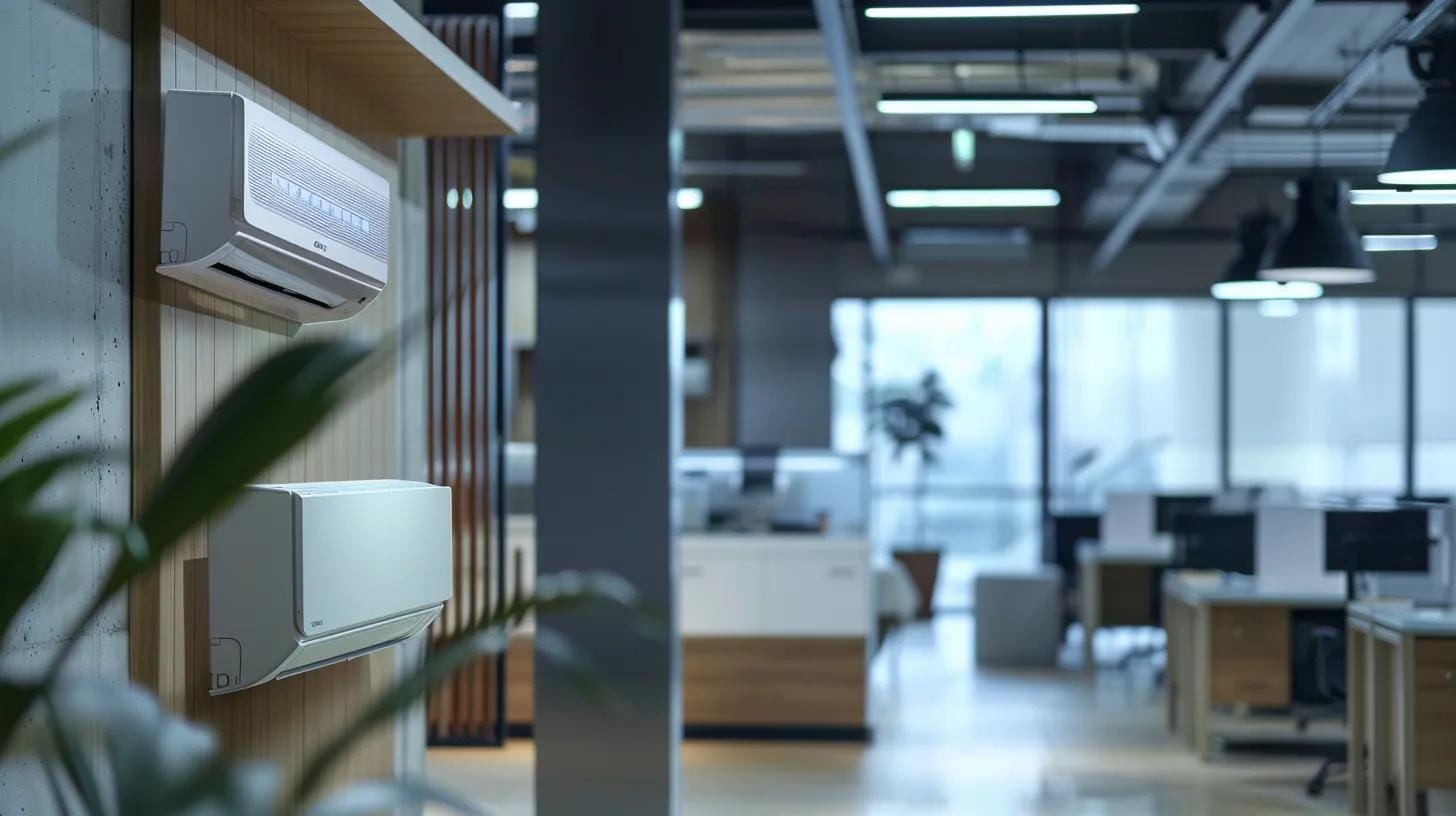
As temperatures climb in Roswell, a reliable air conditioner becomes more than a luxury—it’s a necessity. But when your system starts acting up, you’re faced with a tough decision: is it worth repairing, or is it time to replace the unit altogether?
This choice often comes down to a combination of age, repair history, and performance. Understanding the signs of an aging system and knowing when replacement is the smarter financial move can save you from ongoing headaches and high energy bills.
Assessing the Age and Condition of Your Current AC
The average lifespan of a residential air conditioner falls between 10 and 15 years. That number can vary depending on how often the system is used, whether it has been maintained regularly, and the type of climate it operates in. In Roswell, where summers are long and hot, systems often work harder than in milder regions, which can shorten their lifespan.
If your AC is more than a decade old and has needed multiple repairs over the last few seasons, it may be nearing the end of its functional life. Older systems also tend to use more energy and may not cool your home as effectively, especially if components like compressors or evaporator coils are wearing out.
Comparing Repair Costs Versus Replacement Investment
One of the most important things to consider is cost. Occasional repairs on a fairly new unit may make sense, but when repairs become more frequent or expensive, they can add up quickly. A helpful rule of thumb is the 50% rule: if a repair costs more than 50% of what it would cost to install a new system, replacement is usually the better option. This is particularly true if the system is out of warranty or if energy bills have been steadily rising despite regular maintenance.
Even if a repair solves the immediate problem, it doesn’t guarantee the system won’t fail again in a few months. Replacing an unreliable unit with a newer, more efficient model can prevent ongoing repair costs and reduce stress during peak summer months.
Benefits of Upgrading to a Newer More Efficient AC Model
New air conditioning units are designed with energy efficiency in mind. Models with higher Seasonal Energy Efficiency Ratio (SEER2) ratings use less energy to provide the same level of cooling, which can result in noticeable savings on your monthly utility bills.
Besides better efficiency, many modern units include features like smart thermostats, variable speed fans, and noise-reduction technology. These upgrades contribute to improved comfort and lower long-term maintenance needs.
Additionally, newer units often qualify for energy rebates or tax incentives. While the initial cost may be higher, the combined benefit of incentives, lower operating costs, and fewer repairs can make a replacement system the more cost-effective option over time.
Making an Informed Decision for Your Roswell Home’s Comfort
There are several indicators that suggest it’s time to stop repairing and start thinking about a new AC system:
- Outdated Refrigerant: If your unit uses R-22 (also known as Freon), it may be difficult and expensive to repair due to the phase-out of this refrigerant.
- Frequent Repairs: If you’ve called for service more than twice in the past year, your system may be on its last legs.
- Rising Energy Bills: A sudden or ongoing spike in cooling costs often signals your system is working harder than it should.
- Uneven Cooling: If some rooms are consistently warmer than others, your system may no longer be operating at full capacity.
- Unusual Noises: Clanking, grinding, or loud buzzing sounds are red flags that critical components may be failing.
Frequently Asked Questions
Q: How can I determine the proper AC size for my Roswell home? A: A cooling load calculation, which considers your home’s square footage, insulation, and window sizes along with local climate conditions, will recommend the appropriate BTU rating for optimal performance.
Q: What maintenance tasks should I perform on my air conditioner? A: Regular tasks include cleaning or replacing air filters, cleaning condenser coils, ensuring vents remain unobstructed, and scheduling annual professional tune-ups to maintain efficiency and extend your unit’s lifespan.
Q: Are smart thermostats worth the investment in Roswell? A: Yes, smart thermostats allow precise temperature control and remote adjustments which can reduce energy consumption by adapting cooling schedules according to occupancy and weather, ultimately lowering utility bills.
Q: When should I consider replacing my current air conditioner? A: Consider replacement if your AC is over 10–15 years old, frequently needs repairs, or does not meet today’s energy efficiency standards. Upgrading can lead to long-term savings and more reliable cooling.
Q: What financing options are available for purchasing a new AC unit? A: Many local HVAC companies, including CoolPro, offer financing plans, low-interest payment options, or rebate programs. Compare offers from multiple contractors and check for state or federal incentives.
Q: How do I improve the overall efficiency of my home’s cooling system? A: Efficiency improvements include proper system sizing, regular maintenance, optimized thermostat settings, ensuring good airflow, upgrading to smart thermostats, and sealing ductwork or insulation gaps.
Q: What are the common signs that my AC is not working efficiently? A: Look for uneven cooling, unusual noises, frequent cycling, reduced energy performance, or water leaks. Early detection through routine check-ups is key to avoiding major issues.
Final Thoughts
Choosing the right air conditioner can make all the difference in keeping your Roswell home cool, comfortable, and energy-efficient through the hottest months. Whether you’re upgrading an older unit or installing a new system, the HVAC experts at CoolPro Heating & Cooling are ready to guide you to the ideal solution for your space and budget. Call us today at 770-694-6232 to discuss your needs and schedule a consultation—let us help you beat the heat with a truly reliable cooling system!

